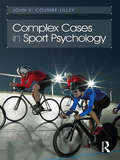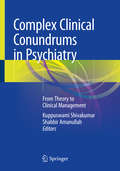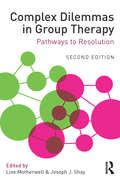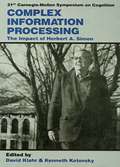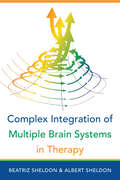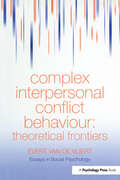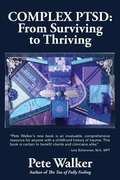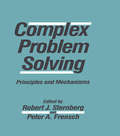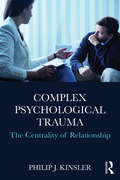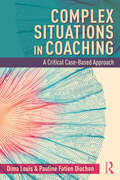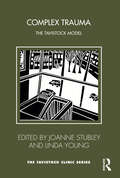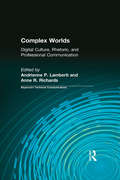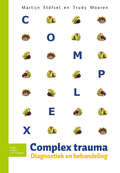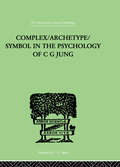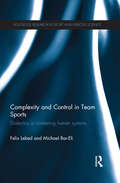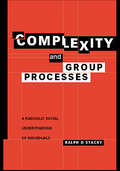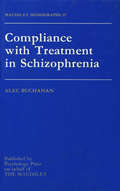- Table View
- List View
Complex Cases in Sport Psychology
by John E. Coumbe-LilleyComplex Cases in Sport Psychology offers instructors and students a unique and novel approach to teaching and learning about sport psychology. The book consists of a series of character-driven narratives—set within the context of a university athletic department—which encourage discussion and critical thinking in order to find solutions to issues such as athletes lacking in motivation, introducing mental skills training programs and improving recruitment. The book begins with a section introducing the teaching cases approach (suggesting further reading and methods for its delivery), the university setting and the issues this context provides for the sport psychologist, and the cast of characters involved. It goes on to detail over twenty cases spread across four parts (organizational performance, team performance, individual performance, and injury and recovery), each based around a piece of theory and including clear learning outcomes, tasks and non-prescriptive guidance on reaching a solution. With online resources which include topical cases, further guidance on the teaching cases approach and an instructor’s manual, this is an essential supplementary resource for any instructor looking to provide experiential learning and encourage critical thinking in their sport psychology classrooms. Covering a full range of psychological issues in a relevant sporting context, it is also an important, hands-on guide to counselling for any upper-level student of sport psychology.
Complex Cases of Personality Disorders: Metacognitive Interpersonal Therapy
by Antonio Semerari Antonino Carcione Giuseppe NicoloThis book proposes an integrated model of treatment for Personality Disorders (PDs) that goes beyond outdated categorical diagnoses, aiming to treat the general factors underlying the pathology of personality. The authors emphasize the development of metacognitive functions and the integration of procedures and techniques of different psychotherapies.The book addresses the treatment of complex cases that present with multiform psychopathological features, outlining clinical interventions that focus on structures of personal meaning, metacognition and interpersonal processes. In addition, this book:Provides an overview of pre-treatment phase procedures such as assessment interviewsExplains the Metacognitive Interpersonal Therapy (MIT) approach and summarizes MIT clinical guidelinesOutlines pharmacological treatment for patients with PDsIncludes checklists and other useful resources for therapists evaluating their adherence to the treatment methodComplex Cases of Personality Disorders: Metacognitive and Interpersonal Therapy is both an insightful reexamining of the theoretical underpinnings of personality disorder treatment and a practical resource for clinicians.
Complex Clinical Conundrums in Psychiatry: From Theory To Clinical Management
by Kuppuswami Shivakumar Shabbir AmanullahThis book provides the readers with a series of complex cases that are organized by psychiatric disorder. Written by experts in the field, the cases offer insight on how to navigate care in delicate situations while considering preexisting medical conditions. Topics cover pharmacological concerns in women who are pregnant or nursing, working with dementia patients suffering from HIV, assessing and treating ADHD in special populations, monitoring medication use in patience recovering from Substance Use Disorder, and working with patients suffering from personality disorders. Each chapter offers guidance through the maze of classifications, clinical features, diagnosis and various complex interventions. The book also covers new information on the advances in research and management aspects. Complex Clinical Conundrums in Psychiatry is a valuable resource for psychiatrists, psychologists, family physicians, geriatricians, counselors, social workers, nurses, and all medical professionals working with complex psychiatric patients.
Complex Dilemmas in Group Therapy: Pathways to Resolution
by Joseph J. Shay Lise MotherwellGroup work presents the therapist with many situations, considerations, and, ultimately, decisions that are unique to the practice of group psychotherapy. The second edition of Complex Dilemmas in Group Therapy includes advice and insights from more than fifty of the most eminent group therapists in the world and is edited by two leading thinkers and practitioners in the field. In its pages clinicians will find expert guidance on some of the most difficult situations group therapists face, and they'll come away from the book with a host of practical strategies for facilitating their work as well as deeper and broader understanding of the overarching ideas that underpin the practice of successful group therapy.
Complex Human Dynamics: From Mind to Societies (Understanding Complex Systems)
by Andrzej Nowak Katarzyna Winkowska-Nowak David BréeThis book, edited and authored by a closely collaborating network of social scientists and psychologists, recasts typical research topics in these fields into the language of nonlinear, dynamic and complex systems. The aim is to provide scientists with different backgrounds - physics, applied mathematics and computer sciences - with the opportunity to apply the tools of their trade to an altogether new range of possible applications. At the same time, this book will serve as a first reference for a new generation of social scientists and psychologists wishing to familiarize themselves with the new methodology and the "thinking in complexity".
Complex Information Processing: The Impact of Herbert A. Simon (Carnegie Mellon Symposia on Cognition Series)
by David Klahr Kenneth KotovskyHere, several leading experts in the area of cognitive science summarize their current research programs, tracing Herbert A. Simon's influence on their own work -- and on the field of information processing at large. Topics covered include problem- solving, imagery, reading, writing, memory, expertise, instruction, and learning. Collectively, the chapters reveal a high degree of coherence across the various specialized disciplines within cognition -- a coherence largely attributable to the initial unity in Simon's seminal and pioneering contributions.
Complex Integration of Multiple Brain Systems in Therapy (IPNB #0)
by Beatriz Sheldon Albert SheldonEnabling patients’ minds to change the structure of their brains. Beatriz and Albert Sheldon have spent the last 20 years developing the novel therapeutic paradigm called Complex Integration of Multiple Brain Systems (CIMBS). They have pioneered new methodology for "reading" and assessing emotional states using their patients’ carefully observed psychophysiological phenomena as empirical evidence. CIMBS also incorporates the latest groundbreaking research on neuroplasticity, brain development, and therapeutic change. This book details their novel neurobiological and psychotherapeutic paradigm—and reveals how therapists can use it for more successful treatment. Clients come to therapy troubled by deeply ingrained neural circuits and emotional habits. The authors demonstrate how they use psychophysiological perspectives to recognize limitations in brain systems that are interfering with their patients’ functioning. And through “physiopsychotherapy,” they activate self-affirming, nonconscious emotional resources to change rigid, maladaptive neural circuits. CIMBS offers a way of “integrating” these [brain system] resources to foster more complex and flexible mental functioning and to produce more successful psychotherapeutic outcomes. The therapeutic attachment relationship between therapist and patient, and “present moment” experiences within the session rather than recollections of past trauma, are key elements in this unique emotional resource-based mode of therapy. This book is wide-ranging in documenting CIMBS' success at operationalizing neuroscience research. Translating their academic, scientific, and clinical research and successful training courses into a reference work that you can hold in your hands and savor at leisure, the Sheldons have produced an approachable, intriguing, yet comprehensive milestone in the psychotherapeutic literature.
Complex Interpersonal Conflict Behaviour: Theoretical Frontiers (Essays in Social Psychology)
by Evert Van der VliertThis book is about reactions to interpersonal conflict such as avoiding, negotiating, and fighting. It breaks away from the prevailing assumption that conflict behaviours are mutually isolated reactions having mutually isolated effects. Instead, reactions are viewed as components of complex conflict behaviour that influence each other's impact on the substantive and relational outcomes. The simultaneous and sequential occurrence of, for example, problem solving and fighting should therefore be studied together and not separately. The author presents a ladder of stepwise increases in theoretical quality, and designs the sequence of chapters in such a way that the theoretical value increases step by step. The lower steps lead to the description of behavioural components and to a model of integrative and distributive dimensions. The upper steps lead to the dimensions of dual concern for one's own and the other's goals and to complexity explanations in terms of the novel paradigm of conglomerated conflict behaviour. The chapters are summarised into thirty-four interrelated propositions. Six empirical studies demonstrate the validity of crucial propositions at each level of the theoretical framework. This monograph primarily reaches out to an academic readership. However, due to its clear structure, its comprehensive propositions, its frequent use of figures, and its glossary, the book will also provide an invaluable resource for any student and practitioner interested in conflict management and negotiation.
Complex PTSD: From Surviving to Thriving: A Guide and Map for Recovering from Childhood Trauma
by Pete Walker<p>I have Complex PTSD [Cptsd] and wrote this book from the perspective of someone who has experienced a great reduction of symptoms over the years. I also wrote it from the viewpoint of someone who has discovered many silver linings in the long, windy, bumpy road of recovering from Cptsd. I felt encouraged to write this book because of thousands of e-mail responses to the articles on my website that repeatedly expressed gratitude for the helpfulness of my work. An often echoed comment sounded like this: At last someone gets it. I can see now that I am not bad, defective or crazy…or alone! <p>This book is a practical, user-friendly self-help guide to recovering from the lingering effects of childhood trauma, and to achieving a rich and fulfilling life. It is copiously illustrated with examples of my own and my clients' journeys of recovering. This book is also for those who do not have Cptsd but want to understand and help a loved one who does. This book also contains an overview of the tasks of recovering and a great many practical tools and techniques for recovering from childhood trauma. It extensively elaborates on all the recovery concepts explained on my website, and many more. <p>Key concepts of the book include managing emotional flashbacks, understanding the four different types of trauma survivors, differentiating the outer critic from the inner critic, healing the abandonment depression that come from emotional abandonment and self-abandonment, self-reparenting and reparenting by committee, and deconstructing the hierarchy of self-injuring responses that childhood trauma forces survivors to adopt. The book also functions as a map to help you understand the somewhat linear progression of recovery, to help you identify what you have already accomplished, and to help you figure out what is best to work on and prioritize now. <p>I hope this map will guide you to heal in a way that helps you to become an unflinching source of kindness and self-compassion for yourself, and that out of that journey you will find at least one other human being who will reciprocally love you well enough in that way.</p>
Complex Problem Solving: Principles and Mechanisms
by Robert J. Sternberg Peter A. FrenschAlthough complex problem solving has emerged as a field of psychology in its own right, the literature is, for the most part, widely scattered, and often so technical that it is inaccessible to non-experts. This unique book provides a comprehensive, in-depth, and accessible introduction to the field of complex problem solving. Chapter authors -- experts in their selected domains -- deliver systematic, thought-provoking analyses generally written from an information-processing point of view. Areas addressed include politics, electronics, and computers.
Complex Problem Solving: The European Perspective
by Peter A. Frensch Joachim FunkeThis volume presents a state-of-the-science review of the most promising current European research -- and its historic roots of research -- on complex problem solving (CPS) in Europe. It is an attempt to close the knowledge gap among American scholars regarding the European approach to understanding CPS. Although most of the American researchers are well aware of the fact that CPS has been a very active research area in Europe for quite some time, they do not know any specifics about even the most important research. Part of the reason for this lack of knowledge is undoubtedly the fact that European researchers -- for the most part -- have been rather reluctant to publish their work in English-language journals. The book concentrates on European research because the basic approach European scholars have taken to studying CPS is very different from one taken by North American researchers. Traditionally, American scholars have been studying CPS in "natural" domains -- physics, reading, writing, and chess playing -- concentrating primarily on exploring novice-expert differences and the acquisition of a complex skill. European scholars, in contrast, have been primarily concerned with problem solving behavior in artificially generated, mostly computerized, complex systems. While the American approach has the advantage of high external validity, the European approach has the advantage of system variables that can be systematically manipulated to reveal the effects of system parameters on CPS behavior. The two approaches are thus best viewed as complementing each other. This volume contains contributions from four European countries -- Sweden, Switzerland, Great Britain, and Germany. As such, it accurately represents the bulk of empirical research on CPS which has been conducted in Europe. An international cooperation started two years ago with the goal of bringing the European research on complex problem solving to the awareness of American scholars. A direct result of that effort, the contributions to this book are both informative and comprehensive.
Complex Psychological Trauma: The Centrality of Relationship
by Philip J. KinslerComplex Psychological Trauma takes clinicians beyond the standard approaches for treating simple, single-stressor incident PTSD. Here the focus is on the major choice points that establish the relational conditions for growth and change. In these pages, new and experienced clinicians alike will find specific guidance for acting in a relationally healing manner and refreshingly practical, real-life advice on what to say in challenging therapy situations.
Complex Situations in Coaching: A Critical Case-Based Approach
by Dima Louis Pauline Fatien DiochonComplex Situations in Coaching is a collection of 20 typical yet underdiscussed issues in coaching, ranging from value conflicts, multiple agendas, power dynamics, and emotion management, to the role of money, etc. Organized into ten chapters, they are positioned into the literature and commented on by world-class coaches, coaching researchers, educators, and program directors. This plurality of voices is designed to foster dialogue, questions, and solutions; this setting, supportive of reflexivity, critical thinking, and diversity awareness, is essential to the development and education of coaches in an increasingly complex world where ready-made solutions prove limited. Thus, beyond a 'toolkit approach', this book engages in a thought-provoking and multi-perspective journey in support of the professionalization and continuous education of coaches, instructors, and/or supervisors.
Complex Social Issues and the Perinatal Woman
by Laura AbbottPursuing a multidisciplinary approach, this book demonstrates the best quality care for pregnant women and new mothers who may have complex social needs. This book will benefit all health and social care professionals working in women’s health, while also providing a valuable reference guide for maternity departments. The latest Mothers and Babies: Reducing Risk through Audits and Confidential Enquiries across the UK (MBRRACE-UK) demonstrates the consequences that having multiple complexities has and the need to ensure that susceptible groups receive personalised, appropriate care and meeting the needs of all women is urgent and essential. This book brings together a blend of health and social care professionals, experts by experience and the charity third sector. All have expertise in caring for and supporting perinatal women with issues that may affect their health and the type of care they require. Through our collective writing, we provide a paradigm for partnership working and hope to have strengthened voices by highlighting women’s experiences and the importance of third sector partnerships, working in tandem with women who are experts by experiences and bringing health professionals together. In combination with recommendations from specialists in the field, we have offered a unique mix of compassion and evidence-based guidance. From substance abuse, domestic violence and HIV to experiences of Black, Asian and Ethnic Minorities, homelessness, women seeking asylum and women in prison, we have addressed a range of current issues and provided essential information and opportunities to reflect. Each chapter invites the reader to step into the shoes of the perinatal woman. Through our collective writing, we provide a paradigm for partnership working and hope to have strengthened voices by highlighting diverse experiences. We have looked at how using a trauma informed approach can be applied universally to care for all women and learn from charities such as Birth Companions, the 4M project and the Salamander Trust, how different approaches may directly impact women’s care in a positive and holistic way. An overarching aim of our book has been to find ways to deliver multi-agency continuity of care, whilst being aware of bias, professional responsibilities and an understanding how we can take a holistic approach - crucial for attaining excellence in 21st century maternity care provision.
Complex Trauma Regulation in Children: A Body-Based Attachment Approach
by Suellen Thomson-LinkThis book outlines both the theory and application of regulation intervention strategies for children with complex trauma history. National statistics identify that 1:7 children in the United States are subjected to child abuse or neglect. The age group with the highest reported incidences are in the 1-3 year old age group. The primary perpetrators of this abuse are the child’s caregivers. This age is closely associated with the critical period of development in the areas of the brain, the child’s physiology and their social/emotional well being. When primary attachment is disrupted, delays and disruptions across many domains occur. When the perpetrator of their trauma is the same person who should be ensuring their safety, a child develops behaviors in an attempt to make sense of their world. The behaviors serve a purpose. Behavioral approaches which rely on positive and negative consequences do not adequately address the cause of the behavior and are therefore ineffective. Other existing trauma interventions rely on the individual to cognitively process information. However, when dysregulated, retrieval of information from the frontal lobe of the brain is not physiologically possible. All these approaches also intervene on the assumption that the child knows what normal regulation feels like. Most of these children however have only known chaos and fear novelty. This attachment based intervention model incorporates neurological, physiological, observational and practical regulation intervention strategies for anyone working with children with complex trauma history. It is able to be applied in home, school, community and in therapy environments. When a child feels regulated and safe, the effectiveness of the child’s trauma treatment can be enhanced.
Complex Trauma: The Tavistock Model (Tavistock Clinic Series)
by Linda Young Joanne StubleyThe new diagnosis of Complex Post Traumatic Stress Disorder presents diagnostic and treatment challenges that need to be grappled with, since, in a troubled world, it is increasingly important to understand the impact and aftermath of traumatic experiences and, crucially, how to work with those affected by them. In Complex Trauma, Joanne Stubley and Linda Young habe assembled a fascinating range of approaches in order to explore the questions of understanding and intervention. They detail the relevance of an applied psychoanalytic approach, both in the Tavistock Trauma Service and, more broadly, in illuminating understanding of traumatized individuals. The book includes chapters related to the impact of trauma on the body, as well as on the mind, incorporating neurobiological and attachment theory to develop ideas on the impact and aftermath of complex trauma. A number of specialist areas of trauma work are covered within this volume, including work with adolescents, with refugees and asylum seekers, with military veterans, and with survivors of child sexual abuse. The editgors bring together chapters that will be of interest to those working with traumatized individuals in a variety of settings and using different modalities. The central importance of relationships, as understood within the psychoanalytic model, is depicted throughout as being at the heart of understanding and working with traumatic experience.
Complex Worlds: Digital Culture, Rhetoric and Professional Communication (Baywood's Technical Communications)
by Adrienne P. Lamberti and Anne R. Richards'Complex Worlds: Digital Culture, Rhetoric, and Professional Communication' is a collection of thought-provoking scholarly essays by teachers and industry practitioners in professional communication and technology-oriented fields. Scrupulously edited for a range of readers, the collection aims to help familiarize advanced students, teachers, and researchers in professional communication, computers and writing, literacy, and sister disciplines with key issues in digital theory and practice. An emphasis on the situations of and audiences for digital communication identifies 'Complex Worlds' as a rhetorical approach. In an era when globalizing markets and digital technologies are transforming culture around the world, readers should find the collection both engaging and timely. The collections' twelve essays constitute a diverse and thematically coherent set of inquiries. Included are explorations of topics such as cyber activism, digital 'dispositio', citizen and open-source journalism, broadband affordances, XML, digital resumes, avant garde performance art, best pedagogical practices, and intercultural communication between East and West, North and South. The text is especially well suited for advanced courses in professional and applied writing, contemporary rhetorics, and digital culture. The complexity highlighted in the collection's title is brought into relief by authors who address how the digital is daily unmaking our assumptions about the boundaries between work and school, the global and the local, the private and the public. 'Complex Worlds' offers readers an opportunity to build on their rhetorical awareness by expanding their understanding of the means, aims, and strategies of effective communication--today and in the future.
Complex trauma: Diagnostiek en behandeling
by Martijn Stöfsel Trudy MoorenComplex trauma geeft een behandelrichtlijn volgens het zgn. driefasenmodel. Geschreven voor hen die werken in de praktijk van de geestelijke gezondheidszorg met ernstig getraumatiseerde volwassen mensen, dus voor psychologen, psychotherapeuten, psychiaters, sociaal-psychiatrisch verpleegkundigen en case managers. Te gebruiken als leerboek in het onderwijs en als naslagwerk voor meer ervaren hulpverleners.
Complex/Archetype/Symbol In The Psychology Of C G Jung (International Library Of Psychology Ser. #632)
by Jolande JacobiThis is Volume II of twelve in the Analytical Psychology Series. Originally published in 1925, this is volume one of two on the psychology of C.G. Jung which seeks to clarify and illuminate (though without going into a detailed history of their development) three basic concepts of Jung's vast intellectual edifice concepts that have given rise to numerous misunderstandings.
Complex/Archetype/Symbol in the Psychology of C.G. Jung (Bollingen Series (General) #632)
by Jolande JacobiAs an associate of C. G. Jung for many years, Jolande Jacobi is in a unique position to provide an interpretation of his work. In this volume, Dr. Jacobi presents a study of three central, interrelated concepts in analytical psychology: the individual complex, the universal archetype, and the dynamic symbol.
Complexity and Control in Team Sports: Dialectics in contesting human systems (Routledge Research in Sport and Exercise Science)
by Michael Bar-Eli Felix LebedComplexity and Control in Team Sports is the first book to apply complex systems theory to ‘soccer-like’ team games (including basketball, handball and hockey) and to present a framework for understanding and managing the elite sports team as a multi-level complex system. Conventional organizational studies have tended to define team sports as a set of highly heterogeneous physical, mental and cognitive activities within which it is difficult, if not impossible, to find common behavioural playing regularities or universal pedagogies for controlling those activities. Adopting a whole system approach, and exploring the concepts of control, regulation and self-organization, this book argues that it is possible for coaches, managers and psychologists to develop a better understanding of how a complex system works, and therefore, to more successfully manage and influence a team’s performance. This book draws on literature from the biological, behavioural and social sciences, including, psychology, sociology and sports performance analysis, to develop a detailed, interdisciplinary and multi-level picture of the elite sports team. It analyzes behaviour across five inter-connected levels: the team as a ‘managed institution’; coaching staff controlling players via cybernetic flows; the team as a playing unit; the individual player as a complex dynamic system expressed through behaviour; and a player’s complex physiological/biological system. Drawing these together, the book throws fascinating new light on the elite sports team and will be useful reading for all students, researchers or professionals with an interest in sport psychology, sport management, sport coaching, sport performance analysis or complex systems theory.
Complexity and Group Processes: A Radically Social Understanding of Individuals
by Ralph D. StaceyThe increasing complexity of interdependence between people in modern life makes it more important than ever to understand processes of human relating. In the West we tend to base our understanding of relating on the individual. Complexity and Group Processes suggests an alternative way of understanding human relating. The key questions covered in this book are: · who am I and how have I come to be who I am?· who are we and how have we come to be who we are?· how are we all changing, evolving, and learning? These are fundamental questions in the study of human interaction, and the answers explored in Complexity and Group Processes are highly relevant not only for therapeutic groups but also those who are managing, leading and working in organizations.
Complexity in Health Care: A Paradigm Shift for Clinical Practice
by Steven A. Frankel James A. Bourgeois Steven D. ThurberThis book addresses the principle that successful treatment incorporates a remarkably broad range of clinical variables. Clinicians must identify the extent to which each factor contributes to the success of the treatment process, and how to utilize this information strategically so that their combination enhances outcome.Complex clinical situations involve numerous macroscopic and microscopic components and their interactions. This book describes clinical practices and variables, that should be weighted according to their relevance for achieving treatment precision and improved results.The book is divided into sections, each containing topically organized chapters. Sections build from identifying discrete components of the clinical field to combined variables as they impact treatment progression. The clinical narratives that make up the latter part of the book elaborate on the course of care and the challenges involved in managing complex clinical situations. Cases range from primary care patients with systemic medical and psychiatric co-morbidity to more complex cases requiring the involvement of medical specialists, allied health professionals, and multiple health care systems.Scholarly, practical, and comprehensive, Complexity in Health Care enables clinicians to incorporate previously underappreciated health-related factors into their thinking and practice.
Complexity of Interaction: Studies in Multimodal Conversation Analysis
by Pentti Haddington Tiina Eilittä Antti Kamunen Laura Kohonen-Aho Iira Rautiainen Anna VatanenEveryday social life is deeply tied to the ways in which people talk, interact, and engage in joint activities with each other. This book examines language use and social interaction through the lens of complexity, focusing on how participants establish and maintain shared understanding in multi-layered situations and settings. This book will find readership among students and scholars who use video-based methods and are interested in interaction, intersubjectivity and multimodality.
Compliance With Treatment In Schizophrenia (Maudsley Series)
by Alec BuchananThere is a myth that people with mental disorders comply poorly with treatment. In fact, psychiatric patients are no more likely than patients in other medical specialities to go against the advice of their doctor. That said, it is easy to find instances where psychotropic medication is refused by the supposed beneficiary. The value of neuroleptic treatment in schizophrenia is now widely accepted. Failure to take such treatment is associated with relapse and relapse may endanger the patient and other people. Despite this, people with schizophrenia frequently fail to take their treatment. This study shows that one third can be expected to be non-compliant within two years of leaving a general adult psychiatry ward. It also looks at the reasons for this: the influence of drug side-effects is examined, as well as the impact of each patient's attitude to treatment and whether or not they have stopped taking prescribed medication in the past.
